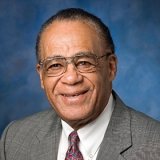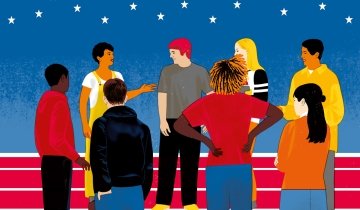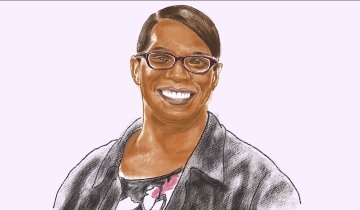The following was written by USC Rossier professor Julie Marsh to honor John Brooks Slaughter, USC Viterbi and USC Rossier professor, on what would have been his 90th birthday:
John Brook Slaughter was a beautiful human being. Much has been said over the years about his accomplishments – a trailblazing engineer, an accomplished academic, a visionary university chancellor and president, and the first Black director of the National Science Foundation. And yet, his biggest achievement in my mind was the example he set for all us of on how to lead a meaningful life with care, humility, and optimism.
For almost a decade, I had the pleasure of sitting in an office next to John’s. Every morning he would greet me with “hello my friend, how are you?” and we’d reflect on the news. In the early years of our friendship we had much to celebrate, but as the years moved on we confronted the tragedy of Trump’s election, racial violence, and USC scandals. And yet, no matter how dire the world seemed, John chose to see the positive. I could always count on his optimism to lessen my worry. He’d tell me we’d find a path forward, we’d win back the White House, and the next generation would show us the light.
In the early hours we’d also share our mutual love of sports. We would mourn the losses of our Trojans, and he would talk fondly about his Chargers or Kansas State wildcats. Aside from his family, there was nothing more important to John than his beloved KS team. One afternoon we heard screams in his office. Several of us in the hall came running out of our offices to see if John was okay. When we knocked on the door, John opened it and said “they tied it up” - apologetically explaining that he’d been watching a livestream of a KS game and got carried away. And his dedication never waned. We had an email exchange six weeks before he passed, about the USC football team, and he told me quite decisively “we need a new defensive coordinator.”
Afternoons were busy for John. He often had a stream of visitors and admirers waiting outside his office. Over the years I had the pleasure of meeting some of his former students and colleagues who would stop by when they were in town. John also made time for his regulars – he mentored undergrads, graduates, and faculty.
Being his office neighbor also meant that I learned about John’s work. Before giving a speech he often shared a draft with me. He was a wonderful orator and had developed the perfect formula: hooking the audience with a moving story followed by an unexpected moment of humor. And wow, did he have stories – from his family members involved in Brown v Board of Education, to the call he received from President Carter when asked to join the NSF, to his time meeting Howard Cosell, to the escapades of his college roommate Paul. No one told a better story than John did.
These stories also become fodder for my teaching. John graciously came to my EdD course a few times to reflect on his experience leading in times of crises and what it meant to face racism. On several occasions, he came to class to share the challenges of being the chancellor of the U of MD and responding to the untimely death of basketball star Len Bias. In preparation for class, he shared with me a folder of news clippings and letters he received after making the difficult decision to reduce the basketball season for the university’s team to allow them to heal. Many of these letters included racist hate and vitriol – the likes of which I have never seen. He read them to my class and reflected on their impact. To say that my students were moved is an understatement.
Despite all the accomplishments and the wealth of experiences, John was always humble. I recall him coming into my office in March one year to show me a letter from the USC president about receiving the presidential medallion of honor – our university’s highest honor. He had actually received it in January and was just now telling me! The awards would arrive in boxes. I’d notice a new plaque or object on his desk. When I’d ask, he would explain, but he was never one to brag.
Perhaps what I admired most about John was that he truly loved people and treated everyone equally, with care and respect. I asked him once whether he would retire, and he said “Oh no, my wife doesn’t want me at home for lunch.” But then a minute later, he confessed, “I would miss my freshman.” John loved those undergrads. He taught a freshman seminar on technology and society and savored every minute of it. He loved meeting with the students. He loved reading their papers. He loved hearing their ideas. He loved seeing them make connections and motivating them to learn.
I was fortunate to witness this wonderment and love in his interactions with my son. Ben had developed a love of technology early on. When he would come to campus John regularly invited him into his office to hear about Ben’s latest projects. One time, when Ben was about 12 years old, I left him in my office while I went to a meeting. When I returned I found Ben sitting at John’s conference table with another faculty member, Anthony Maddox. They were discussing licensing and how to protect Ben’s intellectual property. In that moment I saw John treating Ben just as he would have treated an adult colleague. It’s no wonder Ben always looked forward to coming to campus! When Ben was 13, John invited him to present to his freshman class. I will never forget sitting on the side listening to John introduce “my friend Benjamin” and ask Ben to present. John then invited students to ask Ben questions, as if Ben were an accomplished expert. What a tremendous gift and profound experience for Ben.
I am forever grateful that Ben and I were able to celebrate John at the naming of the USC Viterbi John Brooks Slaughter Center for Engineering Diversity. I am thrilled that his legacy will live on in this way. I also take great comfort in this difficult time of loss knowing that John touched so many of us in such life-altering ways.
John, I will miss you dearly my friend.





